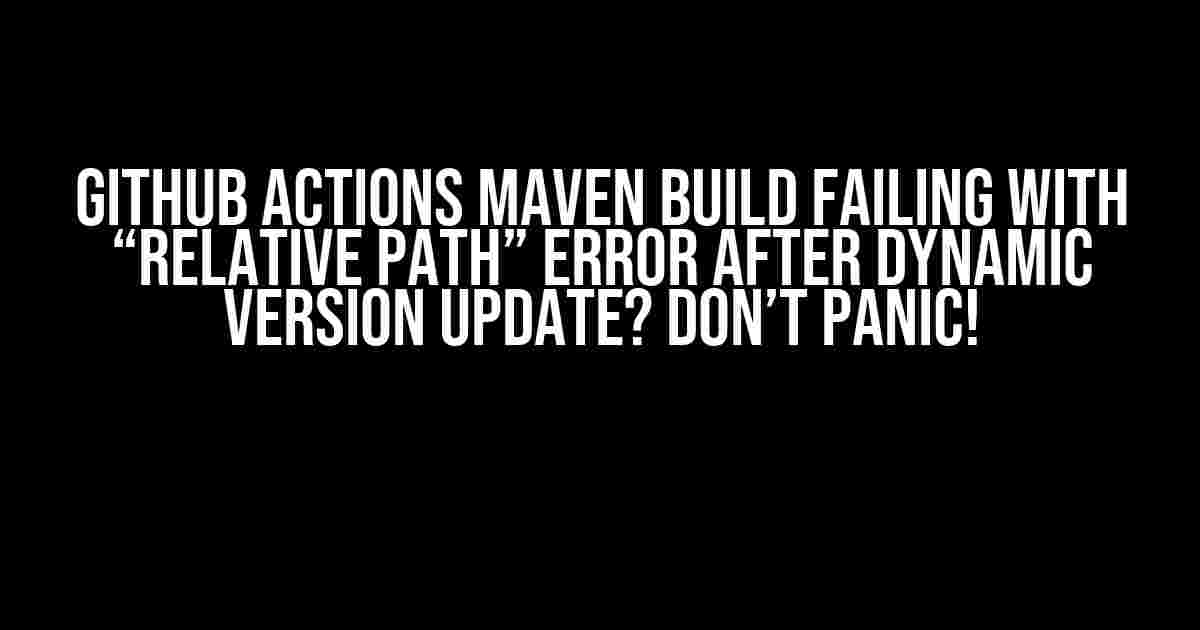If you’re reading this, chances are you’ve stumbled upon one of the most frustrating errors in the GitHub Actions universe: the “relative path” error. Specifically, this error occurs when you’re trying to run a Maven build in GitHub Actions after dynamically updating your project’s version. Fear not, dear reader, for we’re about to embark on a journey to conquer this beast and get your build process back on track!
What’s Causing the Error?
Before we dive into the solution, let’s take a step back and understand what’s causing this error in the first place. When you update your project’s version dynamically in GitHub Actions, the Maven build process gets confused about the relative path of your project’s dependencies. This confusion leads to a failed build, resulting in the dreaded “relative path” error.
A Quick Refresher on GitHub Actions and Maven
If you’re new to GitHub Actions or Maven, here’s a quick rundown:
* GitHub Actions: GitHub Actions is a continuous integration and continuous deployment (CI/CD) tool that allows you to automate your build, test, and deployment processes.
* Maven: Maven is a project management tool that helps you manage your project’s build, reporting, and documentation lifecycle.
Solution Time!
Now that we’ve covered the basics, let’s get to the solution! To fix the “relative path” error, we’ll need to make a few tweaks to our GitHub Actions workflow file and Maven configuration. Don’t worry; it’s easier than you think!
Step 1: Update Your pom.xml File
In your project’s root directory, locate the `pom.xml` file and open it in your favorite editor. Add the following configuration to the `
<build>
<plugins>
<plugin>
<groupId>org.apache.maven.plugins</groupId>
<artifactId>maven-compiler-plugin</artifactId>
<version>3.8.0</version>
<configuration>
<source>1.8</source>
<target>1.8</target>
</configuration>
</plugin>
</plugins>
</build>
This configuration tells Maven to use the correct Java version for compilation.
Step 2: Update Your GitHub Actions Workflow File
Next, open your GitHub Actions workflow file (usually named `.yml`) and add the following snippet:
name: Maven Build
on:
push:
branches:
- main
jobs:
build:
runs-on: ubuntu-latest
steps:
- name: Checkout code
uses: actions/checkout@v2
- name: Set up Maven
run: |
mkdir -p ~/.m2
echo "[CLASSPATH]" > ~/.m2/settings.xml
echo "<aclassPathEntry output/>" >> ~/.m2/settings.xml
echo "</classPathEntry>" >> ~/.m2/settings.xml
echo "</CLASSPATH>" >> ~/.m2/settings.xml
- name: Update Maven version
run: |
mvn --batch-mode --update-version ${GITHUB_SHA}
- name: Run Maven build
run: |
mvn clean package -Dmaven.repo.local=~/.m2/repository
This workflow file sets up the environment for Maven, updates the version dynamically, and runs the Maven build process.
Step 3: Configure Maven to Use the Correct Repository
In the same workflow file, update the `maven.repo.local` property to point to the correct repository location:
- name: Run Maven build
run: |
mvn clean package -Dmaven.repo.local=${GITHUB_WORKSPACE}/.m2/repository
This tells Maven to use the repository located in the `GITHUB_WORKSPACE` directory.
Step 4: Update Your Maven Version Dynamically
In your `pom.xml` file, update the version element to include the `${GITHUB_SHA}` environment variable:
<version>${GITHUB_SHA}</version>
This dynamically updates the version based on the current Git commit SHA.
Putting it All Together
With these changes in place, your GitHub Actions workflow should now successfully build your Maven project without throwing the “relative path” error. Here’s a summary of the changes we made:
- Updated the `pom.xml` file to include the Maven compiler plugin configuration.
- Updated the GitHub Actions workflow file to set up the environment for Maven, update the version dynamically, and run the Maven build process.
- Configured Maven to use the correct repository location.
- Dynamically updated the Maven version using the `GITHUB_SHA` environment variable.
Troubleshooting Tips
If you’re still encountering issues, here are some troubleshooting tips to keep in mind:
- Make sure you’ve updated your `pom.xml` file correctly.
- Verify that your GitHub Actions workflow file is using the correct environment variables.
- Check the Maven repository location to ensure it’s correct.
- Review your Maven version update process to ensure it’s working as expected.
Conclusion
There you have it! With these straightforward steps, you should be able to resolve the “relative path” error in your GitHub Actions Maven build process after dynamically updating your project’s version. Remember to stay calm, take a deep breath, and troubleshoot methodically if you encounter any issues.
If you have any questions or need further assistance, please don’t hesitate to reach out. Happy building!
| Keyword | Description |
|---|---|
| GitHub Actions | A CI/CD tool for automating build, test, and deployment processes. |
| Maven | A project management tool for managing project builds, reporting, and documentation lifecycle. |
| pom.xml | A configuration file for Maven projects. |
| GITHUB_SHA | An environment variable representing the current Git commit SHA. |
| GITHUB_WORKSPACE | An environment variable representing the workspace directory for GitHub Actions. |
Frequently Asked Question
Get answers to your GitHub Actions Maven build woes!
Why does my GitHub Actions Maven build keep failing with a “relative path” error after updating the version dynamically?
This error usually occurs when the `pom.xml` file is not properly configured or if the dependencies are not correctly defined. It’s also possible that the Maven plugin is not correctly configured or is outdated. Make sure to check the `pom.xml` file and the Maven plugin configuration to ensure that they are correctly set up.
How do I troubleshoot the “relative path” error in my GitHub Actions Maven build?
To troubleshoot the error, you can try checking the GitHub Actions log for more detailed error messages, verifying the `pom.xml` file and Maven plugin configuration, and checking the Maven version being used. You can also try running the Maven build locally to see if the issue is specific to GitHub Actions.
Can I use the ` Maven: pom.xml` file to specify the version dynamically in GitHub Actions?
Yes, you can use the `Maven: pom.xml` file to specify the version dynamically in GitHub Actions. You can use Maven’s built-in functionality to update the version dynamically by using the `versions-maven-plugin` or `build-helper-maven-plugin`. These plugins allow you to update the version in the `pom.xml` file during the build process.
Why does my GitHub Actions Maven build still fail after updating the version dynamically?
If your GitHub Actions Maven build still fails after updating the version dynamically, it’s possible that the updated version is not being picked up correctly. Make sure to check the `pom.xml` file and the Maven plugin configuration to ensure that they are correctly configured to use the updated version. Also, try cleaning the Maven cache and re-running the build to ensure that the updated version is being used.
Are there any best practices to avoid “relative path” errors in GitHub Actions Maven builds?
Yes, there are several best practices to avoid “relative path” errors in GitHub Actions Maven builds. These include using absolute paths instead of relative paths, ensuring that the `pom.xml` file and Maven plugin configuration are correctly set up, and using Maven’s built-in functionality to update the version dynamically. Additionally, make sure to test your Maven build locally before running it in GitHub Actions to catch any errors early on.


